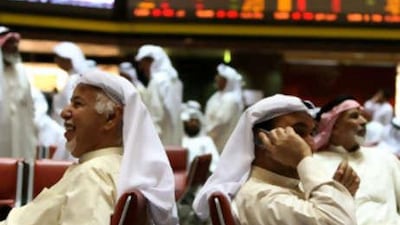UAE stock markets roared back to life yesterday, boosted by the US government's US$700 billion (Dh2.6 trillion) rescue plan - but also because some speculators bought shares to close their illegal positions. The Dubai Financial Market was up nearly 10 per cent - its second-biggest one-day gain - while the Abu Dhabi Securities Exchange rose 5.87 per cent and other exchanges from Kuwait to Qatar joined the resurgence.
The only sour note was Saudi Arabia's Tadawul, which fell 0.63 per cent after its own post-recovery rally, perhaps indicating that the GCC's bounce may be short-lived. Short-selling is illegal in most of the GCC markets - or at least not officially sanctioned. Standard short-selling involves selling a security that is not actually owned by the investor with the intention of buying it back at a lower price and making a profit out of a drop in the share price.
While this type of margin trading is not supported in UAE markets, brokers tend to borrow stock from existing clients to sell and commit to buying back shares within a specified time, while paying the original investor interest. While the US and UK have banned the practice, Abdallah al Traifi, the executive director of the Stock Exchange Authority, made clear that it was illegal in the UAE. "No trading should be done outside legal and regulatory frameworks that govern financial markets. Any unaccredited practices need to be sanctioned by force of law," he said.
While the authorities have limited power due to the fact that many of those involved in short-selling are beyond their jurisdiction and adept at keeping their activities secret, most analysts think yesterday's rapid recovery was governed by necessity rather than positive sentiment. "See the speed of the movement of share prices today. I really think they have been covering those positions, which is one of the reasons shares have been moving up so much," said Mohammed Ali Yasin, the chief executive of Shuaa Securities in Dubai. "It is also the reason why the shares which have been rising the most have been those with the most foreign ownership. Legal and compliance teams at institutions have been closing these down today."
Mr Yasin said international financial institutions had been issuing negative reports on the markets since the summer, which had helped the short-seller and "made him wonder" about the effectiveness of Chinese Walls. "Short-selling, indeed, is against the spirit of the market," said Issa Kathem, the general manager of the Dubai Financial Market. "All parties making recourse to this practice should refrain from doing that and instead abide by the laws set by financial regulation authorities inside UAE."
There is no capital market margin law in the UAE and no entity to control liquidity. "Western markets stopped short-selling because of the current market dynamics, and even if short-selling did occur naturally here, it should stop," said Yazan Abdeen, an equity portfolio manager at ING Investment Management. Market movement was affected by short-selling, which could be seen from the way the market was starting to reverse now, he added.
"A huge part is about foreign investors and brokers not knowing that short-selling doesn't exist here, so people now have to cover the margins and buy back the shares immediately," Mr Abdeen said. Although global markets rallied following news of the ban - with the Dow up 3.35 per cent on Friday, having closed 368.75 points higher at 11,388.44, and the FTSE 100 closed 430 points higher at 5,311.30, 8.8 per cent up from the opening figure on the same day - analysts remain cautious about global markets and are braced for further dips.
"Internationally, when markets move up in such an aggressive manner as they did on Friday, this rise is viewed as a bear market ride," Mr Abdeen said. "Historically, we have not seen such a restructuring reform before since the Great Depression in the 1930s. There is a further drop in store in international markets." What effect this will have on GCC markets remains to be seen. afoxwell@thenational.ae
shamdan@thenational.ae

